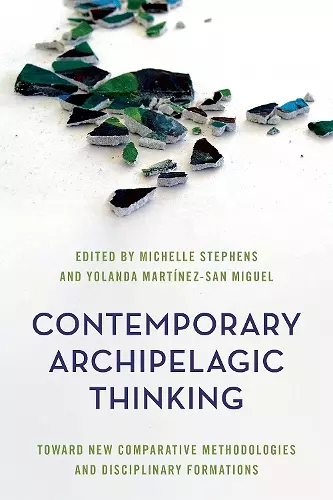Contemporary Archipelagic Thinking
Toward New Comparative Methodologies and Disciplinary Formations
Yolanda Martínez-San Miguel editor Michelle Stephens Michelle Stephens editor
Format:Paperback
Publisher:Rowman & Littlefield
Published:26th Apr '24
Currently unavailable, and unfortunately no date known when it will be back

Contemporary Archipelagic Thinking takes as point of departure the insights of Antonio Benítez Rojo, Derek Walcott and Edouard Glissant on how to conceptualize the Caribbean as a space in which networks of islands are constitutive of a particular epistemology or way of thinking. This rich volumetakes questions that have explored the Caribbean and expands them to a global, Anthropocenic framework.
This anthology explores the archipelagic as both a specific and a generalizable geo-historical and cultural formation, occurring across various planetary spaces including: the Mediterranean and Aegean Seas, the Caribbean basin, the Malay archipelago, Oceania, and the creole islands of the Indian Ocean. As an alternative geo-formal unit, archipelagoes can interrogate epistemologies, ways of reading and thinking, and methodologies informed implicitly or explicitly by more continental paradigms and perspectives. Keeping in mind the structuring tension between land and water, and between island and mainland relations, the archipelagic focuses on the types of relations that emerge, island to island, when island groups are seen not so much as sites of exploration, identity, sociopolitical formation, and economic and cultural circulation, but also, and rather, as models.
The book includes 21 chapters, a series of poems and an Afterword from both senior and junior scholars in American Studies, Archaeology, Biology, Cartography, Digital Mapping, Environmental Studies, Ethnomusicology, Geography, History, Politics, Comparative Literary and Cultural Studies, and Sociology who engage with Archipelago studies. Archipelagic Studies has become a framework with a robust intellectual genealogy.. The particular strength of this handbook is the diversity of fields and theoretical approaches in the Humanities, Social Sciences and Natural Sciences that the included essays engage with. There is an editor's introduction in which they meditate about the specific contributions of the archipelagic framework in interdisciplinary analyses of multi-focal and transnational socio-political and cultural context, and in which they establish a dialogue between archipelagic thinking and network theory, assemblages, systems theory, or the study of islands, oceans and constellations.
Through literary studies, anthropology and archaeology, poetry, philosophy, cartography, eco-environmental critique, ethnomusicology—and more—the contributors to Contemporary Archipelagic Thinking provide dazzling insights into fragments of time, space, genealogy, and political culture that shape global “interlapping” journeys. Across the Pacific, Caribbean, Mediterranean, Atlantic, and Indian Ocean, they capture elusive experiences that redefine histories and narratives lived through continents, oceans, and islands. -- Matt Matsuda, professor of history, Rutgers University
Archipelagic modes of thought offer just what we need to grasp the ambiguities of our contemporary world, and Contemporary Archipelagic Thinking offers an indispensable guide. Attentive to the development of new ways of theorizing, always geographically specific, never forgetful of the legacies of colonialism, this is an urgent book but also one that makes time to remember poetry. -- Peter Hulme, emeritus professor of literature, University of Essex
Archipelagic thinking centers islands’ geographies and their populations’ histories as an onto-ecological ferment producing mobilities between and among seas, lands, continents, and peoples. This volume’s prose and poetry shift the meaning of islands, moving from insular islands to spaces that are produced vis-à-vis the intertwinements of place and the inseparable autonomies of sociocultural practices. This bold and dynamic thinking––archipelagic thinking––is a provocative text that champions a methodology. It demands that we think of totality through the elements that compose place––tracing the connections, flows, and mobilities that constitute place. -- Michaeline Crichlow, professor of Caribbean and global studies, Duke University
Yolanda Martinez-San Miguel and Michelle Stephens have gathered in Contemporary Archipelagic Thinking a stellar line-up of scholars and artists who are on the cutting edge of redefining the epistemologies that have traditionally informed area studies. This volume models the interdisciplinarity it calls for, probing the political, ecological, geographical, and aesthetic dimensions of culture beyond the confines of the nation state. Its achievements are many, not the least of which is its capacity to open new ways of imagining the interplay of locality and globality without the tired anxieties of influence that have often plagued previous efforts. -- George Handley, professor of interdisciplinary humanities, Brigham Young University
Like a multilayered archipelago, poetry and scholarship resonate and come together in beautiful new forms in this extraordinary collection. Subaqueous and subterranean connections and entanglements forge new relational paths and unfold in revelatory ways. Inspiring world-making visions, the collection draws attention to the intellectual seismic shifts reimagining how we think through the human, the non-human, and our geographic worlds.
-- Allan Isaac, associate professor of American studies and English, Rutgers, The State University of New JerseyContemporary Archipelagic Thinking reveals what forms of intellectual, political, material, and ecological relation become possible when archipelagoes are imagined not as peripheral or marginal geo-formations, but as models for new modes of affiliation and transformation. The essays and poems in this volume constellate fresh and often surprising perspectives on a contemporary world in which the scales of the global and the local are themselves in shifting relation.
-- Hester Blum, associate professor of English, Penn State UniversityThis groundbreaking collection of essays, by seeking to establish a more flexible definition of the archipelago, draws together its historical, cultural, and diasporic dimensions to seek out new epistemologies, new modes of inquiry and new methodologies that will reframe a range of interdisciplinary approaches by viewing them through an archipelagic prism. By conceiving the analytical and re-presentational potential of islands, oceans and bodies of water as a framework that can theorize multiplicity and difference, and expanding it to a global framework, the resulting disciplinary formations will enable new perspectives and conclusions across a host of fields, from literature and poetics to environmental studies to the study of empire and postcoloniality.
-- H. Adlai Murdoch, Professor of Francophone Studies, Tufts UniversityISBN: 9781538149911
Dimensions: 227mm x 152mm x 30mm
Weight: 776g
496 pages